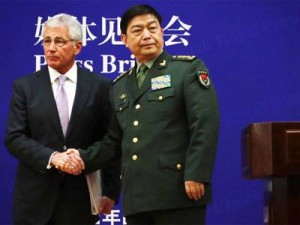
The most terrifying aspect of the collapse of US power worldwide is the US’s indifferent response to it.
In Europe, in Asia, in the Middle East and beyond, America’s most dangerous foes are engaging in aggression and brinkmanship unseen in decades.
As Gordon Chang noted at a symposium in Los Angeles last month hosted by the David Horowitz Freedom Center, since President Barack Obama entered office in 2009, the Chinese have responded to his overtures of goodwill and appeasement with intensified aggression against the US’s Asian allies and against US warships.
In 2012, China seized the Scarborough Shoal from the Philippines. Washington shrugged its shoulders despite its mutual defense treaty with the Philippines. And so Beijing is striking again, threatening the Second Thomas Shoal, another Philippine possession.
In a similar fashion, Beijing is challenging Japan’s control over the Senkaku Islands in the East China Sea and even making territorial claims on Okinawa.
As Chang explained, China’s recent application of its Air-Defense Identification Zone to include Japanese and South Korean airspace is a hostile act not only against those countries but also against the principle of freedom of maritime navigation, which, Chang noted, “Americans have been defending for more than two centuries.”
The US has responded to Chinese aggression with ever-escalating attempts to placate Beijing.
And China has responded to these US overtures by demonstrating contempt for US power.
Last week, the Chinese humiliated Defense Secretary Chuck Hagel during his visit to China’s National Defense University. He was harangued by a student questioner for the US’s support for the Philippines and Japan, and for opposition to Chinese unilateral seizure of island chains and assertions of rights over other states’ airspace and international waterways.
As he stood next to Hagel in a joint press conference, China’s Defense Chief Chang Wanquan demanded that the US restrain Japan and the Philippines.
In addition to its flaccid responses to Chinese aggression against its allies and its own naval craft, in 2012 the US averred from publicly criticizing China for its sale to North Korea of mobile missile launchers capable of serving Pyongyang’s KN-08 intercontinental ballistic missiles. With these easily concealed launchers, North Korea significantly upgraded its ability to attack the US with nuclear weapons.
As for Europe, the Obama administration’s responses to Russia’s annexation of Crimea and to its acts of aggression against Ukraine bespeak a lack of seriousness and dangerous indifference to the fate of the US alliance structure in Eastern Europe.
Rather than send NATO forces to the NATO member Baltic states, and arm Ukrainian forces with defensive weapons, as Russian forces began penetrating Ukraine, the US sent food to Ukraine and an unarmed warship to the Black Sea.
Clearly not impressed by the US moves, the Russians overflew and shadowed the US naval ship. As Charles Krauthammer noted on Fox News on Monday, the Russian action was not a provocation. It was “a show of contempt.”
As Krauthammer explained, it could have only been viewed as a provocation if Russia had believed the US was likely to respond to its shadowing of the warship. Since Moscow correctly assessed that the US would not respond to its aggression, by buzzing and following the warship, the Russians demonstrated to Ukraine and other US allies that they cannot trust the US to protect them from Russia.
In the Middle East, it is not only the US’s obsessive approach to the Palestinian conflict with Israel that lies in shambles. The entire US alliance system and the Obama administration’s other signature initiatives have also collapsed.
After entering office, Obama implemented an aggressive policy in Pakistan, Yemen and elsewhere of killing al-Qaida operatives with unmanned drones. The strategy was based on the notion that such a campaign, that involves no US boots on the ground, can bring about a rout of the terrorist force at minimal human cost to the US and at minimal political cost to President Barack Obama.
The strategy has brought about the demise of a significant number of al-Qaida terrorists over the years. And due to the support Obama enjoys from the US media, the Obama administration paid very little in terms of political capital for implementing it.
But despite the program’s relative success, according to The Washington Post, the administration suspended drone attacks in December 2013 after it endured modest criticism when one in Yemen inadvertently hit a wedding party.
No doubt al-Qaida noticed the program’s suspension. And now the terror group is flaunting its immunity from US attack.
This week, jihadist websites featured an al-Qaida video showing hundreds of al-Qaida terrorists in Yemen meeting openly with the group’s second in command, Nasir al-Wuhayshi.
In the video, Wuhayshi threatened the US directly saying, “We must eliminate the cross,” and explaining that “the bearer of the cross is America.”
Then there is Iran.
The administration has staked its reputation on its radical policy of engaging Iran on its nuclear weapons program. The administration claims that by permitting Iran to undertake some nuclear activities it can convince the mullahs to shelve their plan to develop nuclear weapons.
This week brought further evidence of the policy’s complete failure. It also brought further proof that the administration is unperturbed by evidence of failure.
In a televised interview Sunday, Iran’s nuclear chief Ali Akhbar Salehi insisted that Iran has the right to enrich uranium to 90 percent. In other words, he said that Iran is building nuclear bombs.
And thanks to the US and its interim nuclear deal with Iran, the Iranian economy is on the mend.
The interim nuclear deal the Obama administration signed with Iran last November was supposed to limit its oil exports to a million barrels a day. But according to the International Energy Agency, in February, Iran’s daily oil exports rose to 1.65 million barrels a day, the highest level since June 2012.
Rather than accept that its efforts have failed, the Obama administration is redefining what success means.
As Strategic Affairs Minister Yuval Steinitz noted, in recent months US officials claimed the goal of the nuclear talks was to ensure that Iran would remain years away from acquiring nuclear weapons. In recent remarks, Secretary of State John Kerry said that the US would suffice with a situation in which Iran is but six months away from acquiring nuclear weapons.
In other words, the US has now defined failure as success.
Then there is Syria.
Last September, the US claimed it made history when, together with Russia it convinced dictator Bashar Assad to surrender his chemical weapons arsenal. Six months later, not only is Syria well behind schedule for abiding by the agreement, it is reportedly continuing to use chemical weapons against opposition forces and civilians. The most recent attack reportedly occurred on April 12 when residents of Kafr Zita were attacked with chlorine gas.
The growing worldwide contempt for US power and authority would be bad enough in and of itself. The newfound confidence of aggressors imperils international security and threatens the lives of hundreds of millions of people.
What makes the situation worse is the US response to what is happening. The Obama administration is responding to the ever-multiplying crises by pretending that there is nothing to worry about and insisting that failures are successes.
And the problem is not limited to Obama and his advisers or even to the political Left. Their delusional view that the US will suffer no consequences for its consistent record of failure and defeat is shared by a growing chorus of conservatives.
Some, like the anti-Semitic conservative pundit Patrick Buchanan, laud Putin as a cultural hero. Others, like Sen. Rand Paul, who is increasingly presenting himself as the man to beat in the 2016 Republican presidential primaries, indicate that the US has no business interfering with Russia’s aggression against Ukraine.
Iran as well is a country the US should be less concerned about, in Paul’s opinion.
Leaders like Sen. Ted Cruz who call for a US foreign policy based on standing by allies and opposing foes in order to ensure US leadership and US national security are being drowned out in a chorus of “Who cares?”
Six years into Obama’s presidency, the US public as a whole is largely opposed to taking any action on behalf of Ukraine or the Baltic states, regardless of what inaction, or worse, feckless action means for the US’s ability to protect its interests and national security.
And the generation coming of age today is similarly uninterested in US global leadership.
During the Cold War and in the immediate aftermath of the September 11 attacks, the predominant view among American university students studying international affairs was that US world leadership is essential to ensure global stability and US national interests and values.
Today this is no longer the case.
Much of the Obama administration’s shuttle diplomacy in recent years has involved sending senior officials, including Obama, on overseas trips with the goal of reassuring jittery allies that they can continue to trust US security guarantees.
These protestations convince fewer and fewer people today.
It is because of this that US allies like Japan, South Korea and Saudi Arabia, that lack nuclear weapons, are considering their options on the nuclear front.
It is because of this that Israeli officials are openly stating for the first time that the US cannot be depended on to either secure Israel’s eastern frontier in the event that an accord is reached with the Palestinians, or to prevent Iran from acquiring nuclear weapons.
It is because of this that the world is more likely than it has been since 1939 to experience a world war of catastrophic proportions.
There is a direct correlation between the US elite’s preoccupation with social issues running the narrow and solipsistic gamut from gay marriage to transgender bathrooms to a phony war against women, and America’s inability to recognize the growing threats to the global order or understand why Americans should care about the world at all.
And there is a similarly direct correlation between the growing aggression of US foes and Obama’s decision to slash defense spending while allowing the US nuclear arsenal to become all but obsolete.
America’s spurned allies will take the actions they need to take to protect themselves. Some will persevere, others will likely be overrun.
But with Americans across the ideological spectrum pretending that failure is success and defeat is victory, while turning their backs on the growing storm, how will America protect itself?
http://carolineglick.com/the-disappearance-of-americas-will/
 Officials at the University of Notre Dame revoke permission for pro-marriage table, tell young Catholics to “cease and desist” promoting natural marriage on campus.
Officials at the University of Notre Dame revoke permission for pro-marriage table, tell young Catholics to “cease and desist” promoting natural marriage on campus.













